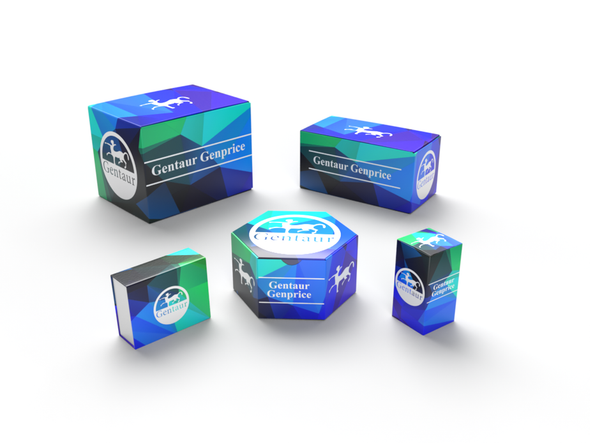749
Rat Heat shock protein beta-2 (HSPB2) ELISA Kit | KTE100836
- SKU:
- 749-KTE100836
- Availability:
- Usually ships in 5 working days
Description
Rat Heat shock protein beta-2 (HSPB2) ELISA Kit | KTE100836 | Gentaur UK, US & Europe Distribution
Application: This Rat Heat shock protein beta-2 (HSPB2) ELISA Kit employs a two-site sandwich ELISA to quantitate HSPB2 in samples. An antibody specific for HSPB2 has been pre-coated onto a microplate. Standards and samples are pipetted into the wells and anyHSPB2 present is bound by the immobilized antibody. After removing any unbound substances, a biotin-conjugated antibody specific for HSPB2 is added to the wells. After washing, Streptavidin conjugated Horseradish Peroxidase (HRP) is added to the wells. Following a wash to remove any unbound avidin-enzyme reagent, a substrate solution is added to the wells and color develops in proportion to the amount of HSPB2 bound in the initial step. The color development is stopped and the intensity of the color is measured.
Detection Method: Colorimetric
Conjugate: N/A
Sample Type: Cell culture supernatants#Serum#Plasma#Other biological fluids
Assay Type: Multiple steps standard sandwich ELISA assay with a working time of 3-5 hours. It depends on the experience of the operation person.
Kit Component: • Rat Heat shock protein beta-2 microplate
• Rat Heat shock protein beta-2 standard
• Rat Heat shock protein beta-2 detect antibody
• Streptavidin-HRP
• Standard diluent
• Assay buffer
• HRP substrate
• Stop solution
• Wash buffer
• Plate covers
Features & Benefits: Rat Heat shock protein beta-2 (HSPB2) ELISA Kit has high sensitivity and excellent specificity for detection of Rat HSPB2. No significant cross-reactivity or interference between Rat HSPB2 and analogues was observed.
Calibration Range: Please inquire
Limit Of Detection: Please inquire
Usage Note: • Do not mix components from different kit lots or use reagents beyond the kit expiration date.
• Allow all reagents to warm to room temperature for at least 30 minutes before opening.
• Pre-rinse the pipet tip with reagent, use fresh pipet tips for each sample, standard and reagent to avoid contamination.
• Unused wells must be kept desiccated at 4 °C in the sealed bag provided.
• Mix Thoroughly is very important for the result. It is recommended using low frequency oscillator or slight hand shaking every 10 minutes.
• It is recommended that all samples and standards be assayed in duplicate or triplicate.
Storage Instruction: The unopened kit should be stored at 2 - 8°C. After opening, please store refer to protocols.
Shipping: Gel pack with blue ice.
Precaution The product listed herein is for research use only and is not intended for use in human or clinical diagnosis. Suggested applications of our products are not recommendations to use our products in violation of any patent or as a license. We cannot be responsible for patent infringements or other violations that may occur with the use of this product.
Background: Heat shock protein beta-2 is a protein encoded by the HSPB2 gene.Alpha-B-crystallin (CRYAB) is a member of the alpha-crystallin/small heat-shock protein (HSP) family and under various neuropathologic conditions accumulates in reactive astrocytes and degenerating neurons. In the 5-prime flanking region of the CRYAB gene on 11q22-q23, where a constitutive DNaseI hypersensitive site is located, Iwaki et al. (1997) identified a gene transcribed in the opposite direction. Analysis of its mRNA structure by RT-PCR and 5-prime/3-prime RACE revealed that this gene is composed of 2 exons and encodes a new member of the alpha-crystallin/hsp family. They termed the gene HSPB2. Iwaki et al. (1997) also determined the complete genomic structure of the rat homolog of HSPB2.
Alternative Names: HSPB2; HSP27; Hs.78846; LOH11CR1K; MGC133245; MKBP; heat shock 27kD protein 2; heat-shock protein beta-2
Search name: HSPB2; HSP27; Hs.78846; LOH11CR1K; MGC133245; MKBP; heat shock 27kD protein 2; heat-shock protein beta-2
Tag: HSPB2






